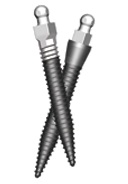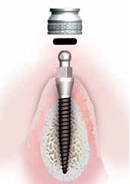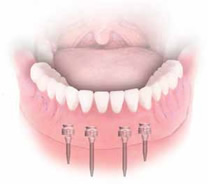|
|
|
|
|
|
|
| General Dentistry | Pediatric Dentistry | Cosmetic Dentistry | Braces | Invisalign® | Implants | Laser |
|
| |
| |
Implants |
| |
|
|
|
MDI | Implants |
|
|
| |
|
|
|
What are dental implants?
Perhaps you know someone who has had dental implants placed. Perhaps you have seen a doctor who thinks dental implants might be a solution for you. No matter how much or little you know about dental implants today, the resources below will provide valuable information for you on implants in general and also mini implants.
How implants can change your life?
Dental implants are titanium posts that are surgically positioned into the jawbone beneath your gums. Once in place, they allow Dr Peng to mount replacement teeth onto them.
How do dental implants work?
Because implants fuse to your jawbone, they provide stable support for artificial teeth. Dentures and bridges mounted to implants won't slip or shift in your mouth; an especially important benefit when eating and speaking. This secure fit helps the dentures and bridges, as well as individual crowns placed over implants, feel more natural than conventional bridges or dentures. For some people, ordinary bridges and dentures are simply not comfortable or even possible, due to sore spots, poor ridges or a gagging reflex. Ordinary bridges must be attached to teeth on either side of the space left by the missing tooth. An advantage of implants is that no adjacent teeth need to be prepared or ground down to hold your new replacement tooth/teeth in place. To receive implants, you need to have healthy gums and adequate bone to support the implant. You must also commit to keeping these structures healthy. Meticulous oral hygiene and regular dental visits are critical to the long-term success of dental implants.
|
|
|
|
|
MDI Implant for Dentures. They are surprisingly affordable.

Having problems with your dentures?
Unable to eat what you want?
Dentures shift, tilt and wander?
Tired of taste and feel of messy denture adhesives?
Gum sometimes sore?
Trouble speaking clearly?
Have fear of smiling?
You can enjoy secure dentures that snap right in place without any adhesives! MDI- Mini Dental Implants is the long-term solution for loose dentures. Ask us for SPECIAL PROMOTION.
How are MDI implant placed?
Placement of the implant is accomplished quickly and easily in a process performed in the office with local anesthesia or light sedation to help make you more comfortable. Using a precise, controlled, minimally invasive surgical technique, MDI implants are placed into the jawbone. The heads of implants protrude from gum tissue and provide a strong, solid foundation for securing your dentures. It is one-step procedure that involves minimally invasive surgery, no sutures nor the typical months of healing. As a result, it is often possible to provide the complete mini implant service in a single office visit. Mini dental implants clearly represent an enormous breakthrough for the dental implant specialty as the most patient-friendly, cost-effective, proven dental implant system available today.
  
What will my first day be like with Mini Dental Implants?
Leave the denture in place until bedtime. You should not experience any excessive bleeding. There will be some mild discomfort but this should be minimal and controlled by recommended pain medication. The denture should feel secure. You may eat as soon as you wish to avoid excessively hard or sticky foods at first. Upon removing the denture, rinse your mouth with an antiseptic mouthwash and carefully clean around each implant fixture with a cotton swab and toothpaste. Use a cotton swab for three days. After that, use your ACCESS toothbrush. It has been specially designed to clean your implants and gently stimulate the surrounding gum tissue.
What's the primary and most effective use for Mini Dental Implants?
The most effective use of this unique dental product is stabilization of a lower denture. Some elderly are "edentulous" (literally meaning lacking teeth) who struggle daily with prosthetic devices. Some have to use adhesive to stabilize the denture. A majority suffer a great deal of discomfort as a result of lose or ill-fitting dentures. Many denture wearers simply withdraw from any type of social engagement as a result of being compelled to wear them. Mini Dental Implant can be utilized to stabilize a denture in a couple of hours by a trained doctor, with the patient leaving the clinic with a stabilized prosthesis.
How specifically can Mini Dental Implants help denture wearers?
The standard insertion protocol for mini dental implants calls for four of them to be gently screwed into the front of a patient's lower jaw. This is a relatively painless procedure that can be performed with a mild anesthesia. The mini dental implants, which are approximately the size of wooden toothpicks, are placed about five millimeters apart in the patient's mandible. The patient's denture is then carefully adjusted by the dentist to allow it to snap onto the four mini implants. The result? A tight fitting, completely reliable system that allows a patient to speak and eat with confidence. The Mini Dental Implants are placed in about an hour's time. Because of the unique, minimally invasive procedure, the minute size of the implants, and the characteristic placement area, the typical Mini Dental Implant patient can enjoy a light meal an hour or so after having the mini implants placed. Further, a denture patient who has had his or her prosthesis stabilized with MDI can remove and replace the denture easily after a little practice, and can easily utilize good.
The standard dental implants are quite expensive. What about Mini Dental Implants?
Mini Dental Implants are surprisingly affordable, and are usually available at a fraction of the cost of traditional implants. By choosing the MDI, you've chosen an enhanced way of life free of a lot of the discomforts and heartaches of a loose or ill-fitting denture. That's worth a lot.
What's a typical daily routine one might expect once the Mini Dental Implants have been placed?
As with all dental applications, there's a short adjustment period during which time you become comfortable placing and removing the denture. Typically, this involves removal of the lower denture in the morning, brushing the gums and implant area with an access curved bristle toothbrush, rinsing the mouth, rinsing the denture itself, then replacing it.
You must clean and brush the ball of the implant as if they were your natural teeth. As with natural teeth food and bacterial debris must be removed or inflammation of the gums will occur. In addition, food and debris can be forced into the O-ring fixture causing improper seating and loss of retention. The O-ring fixture must also be cleaned out.
The result is a normal day's activity for you, including eating, talking, taking a nap, etc. Then, in the evening, the denture is usually removed again, the ACCESS brush is used, and the mouth thoroughly rinsed. The result is a fully functioning dental appliance that works.
Learn more about MDI Click Here!
↑Back to Top
| |
|
|
Dental Implants
A dental implant is a small man-made titanium screw that serves as the replacement for the root portion of a missing natural tooth. The implant is placed in the bone of the upper or lower jaw and allowed to integrate with the bone and serve as an anchor for the replacement tooth. Dental implants can be used to replace a single lost tooth or many missing teeth. Implant-supported replacement teeth look, feel and function like natural teeth. Dental implants preserve the integrity of the jawbone and reduce the inconvenience associated with tooth loss.
Implant is a very good option for anyone who is missing one or more of their teeth due to injury, disease or decay. If one, a few or all teeth are missing, dental implants in conjunction with a crown or bridge can replace those teeth. Occasionally, older patient express concern that their age may prevent them from enjoying the benefits that dental implant offer. However, health is more of a deterring factor than age. If you are healthy enough to have a tooth extracted, you are probably healthy enough to receive dental implants. Your dentist will determine if you are a candidate for dental implants after a careful evaluation of your dental and medical history.
Is there any pain or discomfort involved?
Most patients report that there is a very little discomfort and that they were much more comfortable following the procedure than they anticipated. Implants are placed in a very gentle fashion and care is taken to the various tissues involved. Anesthesia and patient sedation are used to eliminate any discomfort during the procedure.
Will I ever be without my teeth?
This depends on your situation. Most patients can leave the office wearing some type of temporary prosthesis.
↑Back to Top
|
|
|